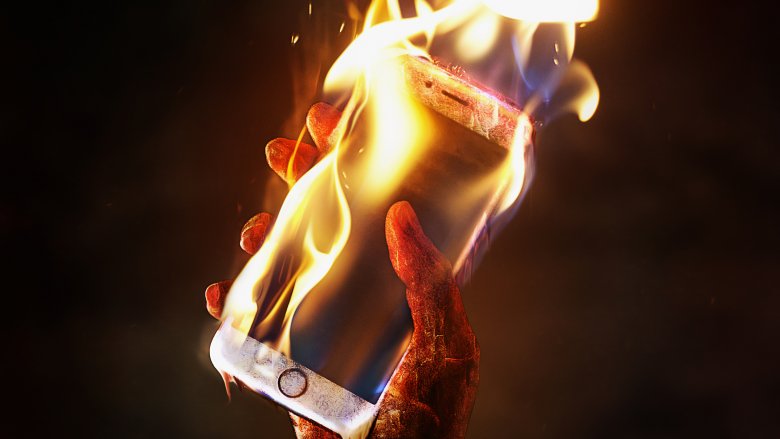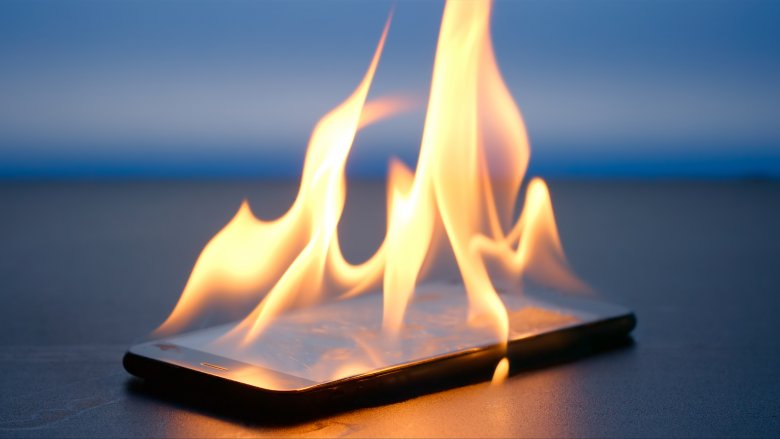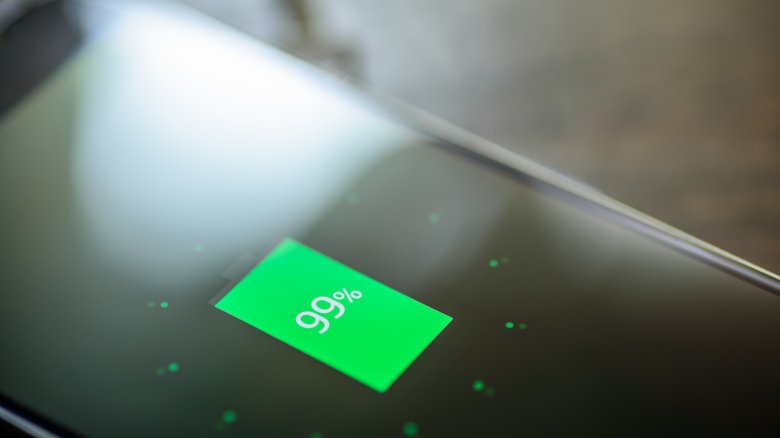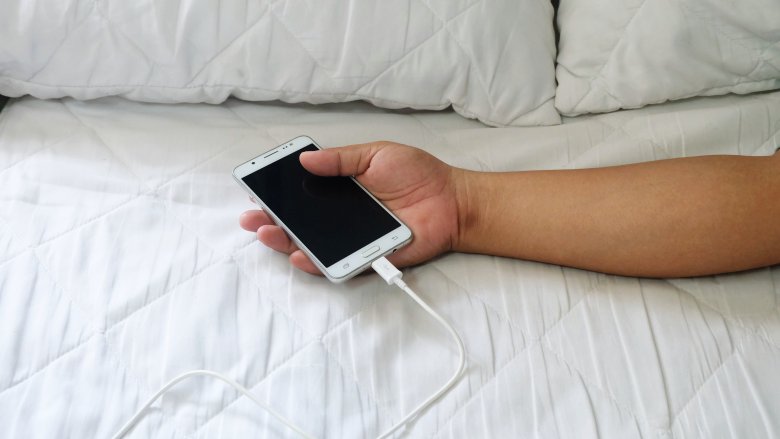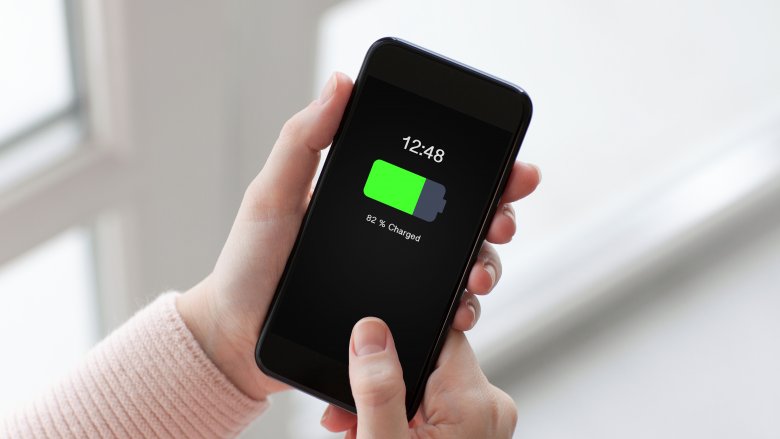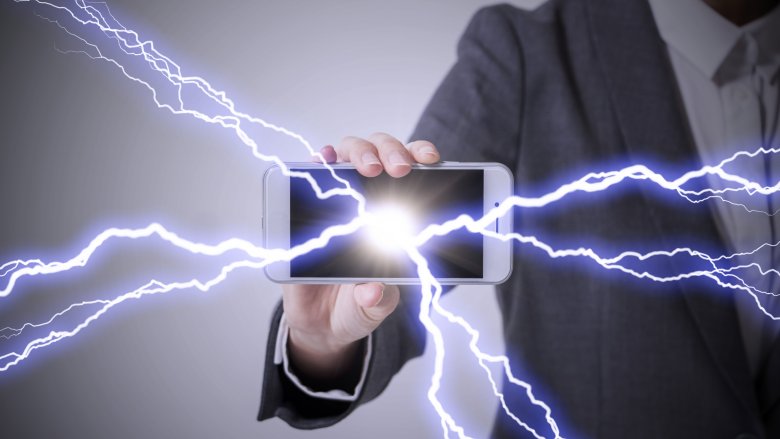Don't Charge Your Cell Phone While You Sleep
Ah, cell phones, both the blessing and burden of 21st-century life. Sure, it's wonderful that Earthlings have made the entire contents of human knowledge accessible from a handheld device, and airport pickups are a lot easier to manage these days, but on the other hand, it sure feels like time gets wasted a lot more easily now. Instagram is a full-time job, and those candies aren't going to crush themselves. Probably the worst time killer of all, though, is having to hunt for outlets every time your battery runs out, and it sucks having to sit in the lousy corner seat near the plug every time you're at a restaurant.
In order to avoid this first world problem, lots of people just charge their phone at night, while they sleep. It's easier, right? Just plug in, lie down, and wake up with a wonderful 100 percent fresh start. Unfortunately, this is actually one of the worst ways to charge your phone, and here's why.
You're killing your battery
Listen, if you're going to keep charging your cell phone all night, every night, you might as well call yourself the Grim Reaper because you're sucking the life right out of that poor battery.
From the moment a newborn rechargeable battery enters the world, it starts degrading. According to Time, the batteries that power your favorite mobile devices only have a limited time to keep going (and going, and going...) before they start losing their charge faster. You know this, of course, since your 2-year-old phone craps out way faster than it used to. What you might not know, though, is that the more time your phone spends sucking away at the charger, the faster its battery capacity will decline. If you're plugging it in every night for eight hours, you're effectively keeping it on the hook for about four months of the year and bleeding it dry way faster than you need to. Think of the charger as being like greasy fast food: Sure, it's still food, but you really shouldn't be eating it constantly.
It might start a fire
Okay, to be fair, this isn't a common problem, but it's certainly a scary one. If you do charge your phone at night, there's a fair chance you also check your phone before bed, and maybe even pass out with the phone under your pillow. The problem with this, as a New Hampshire fire department pointed out in 2017, is that if your phone is plugged in, it generates heat. If you trap the heat under pillows, blankets, and sheets, it has the potential to light up. While this doesn't happen often, the Leicester Mercury reported in 2018 that the U.K. was hit by a series of fires caused by cell phone chargers.
Reader's Digest interviewed a repair technician about this hellish nightmare scenario, and while he did reassure everybody that most phones won't bring down the house, wiring defects are a real risk factor. And if you use the same charger long enough, rolling around on it and kinking its wires, you can potentially cause more issues. It's not too likely, but why play with fire?
It forces the battery to bounce back and forth like a ping pong ball
Imagine filling a glass of beer right up to the rim, taking a little sip, and then refilling it ... over and over again. According to Time, that's basically what you're doing to your cell phone when you charge it overnight.
See, once your phone finishes charging all the way to that beautiful 100 percent, the charging process halts, just like how you stop pouring the beer right before the glass can overflow. However, even if the phone is doing nothing, it can't sustain that maxed-out charge for long, so it'll trickle back down. As soon as a tiny bit of charge is lost, the charger kicks back in, putting it back to 100. If you've got Mr. Cell Phone plugged in for eight hours, this constant back-and-forth process will continue all night long, and putting your phone through this torturous process every evening will eventually reduce the battery capacity. If you're anxious to get a new phone faster, go for it, but if you want your current baby to hang in a little while longer, you might want to rethink your charging routine.
It just doesn't take that long to charge
When you have to catch a plane at 8 p.m., do you arrive at the airport at 2 p.m.? No? Then why are you charging your cell phone for about six hours longer than you need to? Way back in 2011, a four-week study published in Pervasive Computing showed that the average charging time for a cell phone ranged from 30 minutes to a few hours, with the "longer" times only really kicking in when people charged their phones overnight. Today, most phones will charge in about two hours max, and within a few years, CNET reports that chargers will be capable of getting you from 0-to-100 in just 25 minutes.
Sure, technology isn't there quite yet, but the point still stands: If today's cell phones can charge in just a couple hours, and it damages the battery to leave them charging for longer lengths of time, is the convenience of nighttime charging really worth it?
In a perfect world, you'd keep your phone at 65 percent
For years, the idea has persisted that you should always let your battery wind down to the bottom, and then boost it back to a full charge. And that was true for older, nickel-based batteries. According to Business Insider, letting lithium-ion batteries drop to 0 actually wears out the battery faster, particularly if you're always going from a low charge (i.e., under 25 percent) to a high charge (100 percent). It's actually better for the battery to just do partial charges whenever you have a spare moment.
So, based on these parameters, what charge level should you keep it floating around? The answer, according to Christian Science Monitor, is anywhere between 40 and 80 percent. So never charge it above 80, but never let it drop below 40. That much phone monitoring sounds stressful and exhausting, but until solar-powered phones take over the market, maybe that's just the nature of the beast.
Keeping the phone near your bed is a bad idea
If you're like most people, you probably spend a little too much of your bedtime routine with your phone. In reality, you should probably keep your phone as far away from the pillow as possible. As Business Insider points out, staring at the blue and white lights of your phone right before bed probably disrupts your brain's melatonin production and lowers your sleep quality. If you're starting to feel like Christian Bale in The Machinist, maybe it's time to put the cell phone down.
To make matters worse, in 2017, the California Department of Public Health decided to terrify the population by pointing out that the potential dangers of radiofrequency (RF) energy from cell phones still aren't properly understood, and it's entirely possible that such RF energy might (might!) cause cancer, cognitive issues, and sperm mobility problems. None of this is proven, but the CDPH still recommended keeping the phone far away from your bed at night, and trying to limit the time spent near it overall. Um ... does anyone really believe that, even if this were all proven, people would stare at their phones any less?
It's costing you money
Everyone has a friend who unplugs the coffeemaker after every use, keeps the lights off, and warns about "vampire energy" like it's some kind of mythic curse. Now, while those friends might be a little extreme, they have a point: keeping your phone charger plugged in 24/7, even if it's not charging anything, does cost you money. ZDNet found that the average iPhone charger draws about 130W of power a month, or 1.5KW a year. That equates to about 18 cents on your power bill for the year. Any chargers that aren't factory standard — like that dinky little thing you picked up at the truck stop — can draw 10 times more power.
Okay, honestly, if you own a phone, you're probably rich enough to shrug off 18 cents, or even $1.80, a year. But there's a scarier vampire draining your wallet: the price of a new phone. Since charging your phone while you sleep kills the battery faster, that means you have to buy new phones more often. Smartphone prices are skyrocketing, so if you value your piggy bank, think about how you charge your phone.
One myth debunked
In the interest of, you know, the truth, while there are lots of reasons to not charge your phone while you sleep, at least one commonly cited argument is a load of bunk: Despite what your nerdy coworker might tell you, you can't actually "overcharge" your phone. As TLC explains, today's smartphones and phone chargers are high-tech wonders, equipped with protection chips that will kick in to prevent the phone from taking in more charge than it should. According to PC Magazine, the same protection exists in both laptops and tablets, so in general, the risk of your phone overcharging, frying its circuits, or turning you into Electro from Spider-Man isn't a real threat.
That said, you still shouldn't charge your phone while you sleep. Even if your little pocket pal isn't overcharging, it is bouncing back and forth from that trickle charge, getting a little too hot for the covers, and lowering the lifespan of your battery. So no matter how convenient your charging routine might be, it's time to find a new approach.
